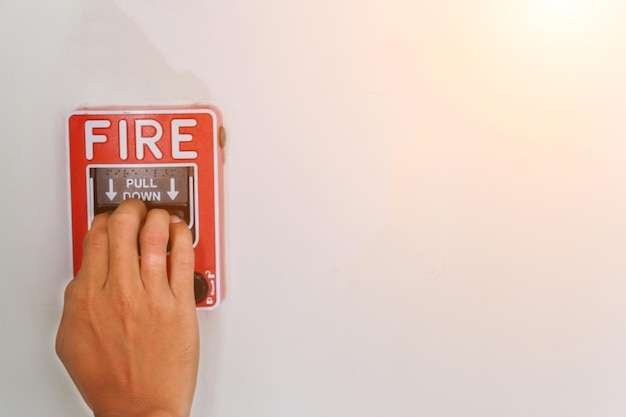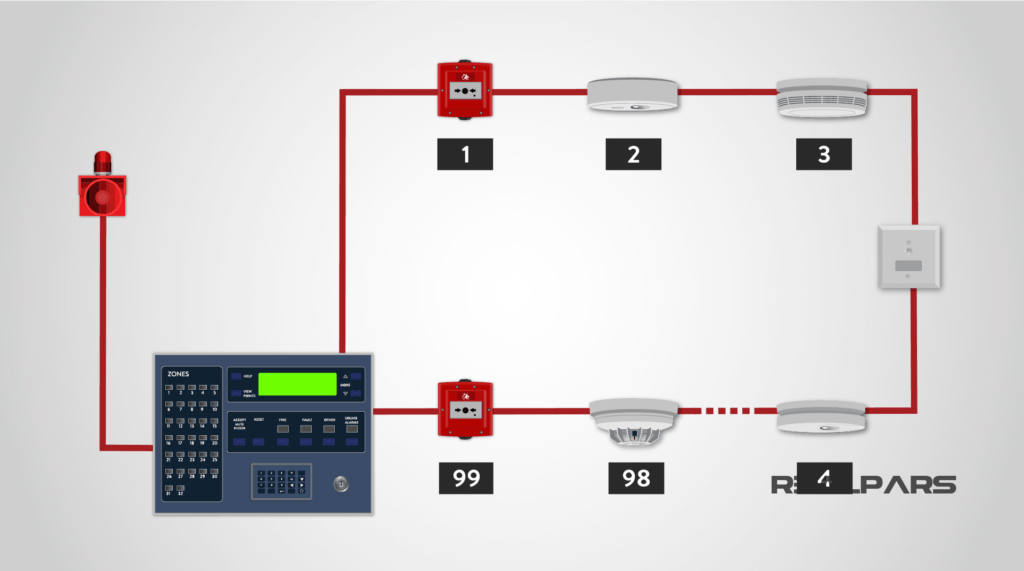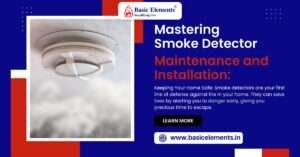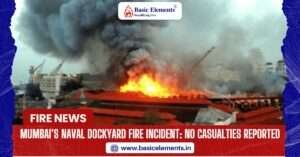When it comes to protecting lives and property, few measures are as critical as implementing robust fire safety protocols. Commercial and industrial facilities, in particular, face a heightened risk of fires due to the presence of combustible materials, electrical equipment, and other potential hazards. As such, facility managers and fire safety officers must remain vigilant in their efforts to safeguard against the devastating consequences of fires.
At the forefront of any effective fire safety strategy lies the installation and proper maintenance of a reliable fire alarm system. These systems serve as the first line of defense, rapidly detecting the presence of smoke, heat, or flames and initiating a swift response. By providing early warning and facilitating timely evacuation, fire alarm systems play a vital role in minimizing the loss of life and property damage.
However, the effectiveness of a fire alarm system hinges not only on its proper installation but also on the implementation of comprehensive monitoring and maintenance protocols. Professional fire alarm monitoring services ensure that any activation of the system is immediately detected and communicated to the appropriate authorities, enabling a rapid response from emergency services. This round-the-clock vigilance provides invaluable peace of mind to facility managers and owners, knowing that their properties are under constant surveillance.
In this article, we will delve into the intricacies of fire alarm monitoring, installation, and service, exploring best practices and highlighting the critical role of professional expertise in ensuring a comprehensive fire safety approach. By understanding the nuances of these vital components, facility managers and fire safety officers can make informed decisions, safeguarding their facilities and the lives of occupants against the ever-present threat of fires.
Understanding Fire Alarm Monitoring

A. What is Fire Alarm Monitoring?
Fire alarm monitoring refers to the continuous surveillance and oversight of a facility’s fire alarm system by a professional monitoring service provider. These services employ advanced monitoring centers that are equipped to receive and respond to signals from fire alarm systems installed at various locations.
When a fire alarm is triggered, whether due to smoke detection, manual pull station activation, or other means, the monitoring center receives an immediate notification. Trained operators then promptly assess the situation and initiate the appropriate response protocols, which may include contacting local emergency services, notifying designated personnel, and providing real-time updates on the incident.
B. Benefits of Professional Monitoring Services
24/7 Monitoring and Rapid Response
One of the most significant advantages of professional fire alarm monitoring services is the around-the-clock vigilance they provide. These monitoring centers operate continuously, ensuring that any fire alarm activation is promptly detected and addressed, regardless of the time of day or night.
In the event of a fire, rapid response is crucial in mitigating the potential for loss of life and property damage. Professional monitoring services facilitate swift action by immediately notifying emergency responders, expediting their arrival at the scene, and enabling a timely evacuation of the premises.
Compliance with Fire Safety Regulations
Many local and national fire safety codes and regulations mandate the implementation of fire alarm monitoring systems in certain types of facilities, such as commercial buildings, healthcare facilities, and educational institutions. By contracting with a reputable monitoring service provider, facility managers can ensure compliance with these regulations, avoiding potential fines or legal consequences.
Peace of Mind for Facility Managers and Owners
Entrusting the monitoring of a fire alarm system to professionals provides invaluable peace of mind for facility managers and property owners. Knowing that their premises are under constant surveillance by trained operators, with established protocols in place for rapid response, allows them to focus on their core operations while minimizing the risks associated with fires.
Furthermore, professional monitoring services often provide comprehensive record-keeping and reporting, documenting all alarm events and system activities. This documentation can be invaluable in the event of an incident, aiding in investigations and ensuring compliance with regulatory requirements.
By leveraging the expertise and resources of professional fire alarm monitoring services, facility managers and fire safety officers can enhance their overall fire safety strategy, ensuring prompt detection, rapid response, and continuous protection for their properties and occupants.
Choosing the Right Fire Alarm System

A. Factors to Consider When Selecting a Fire Alarm System
Selecting the appropriate fire alarm system for a facility is a critical decision that requires careful consideration of several factors to ensure optimal protection and compliance with relevant regulations.
Size and Layout of the Facility
The physical dimensions and layout of a building play a significant role in determining the type and configuration of the fire alarm system required. Larger facilities with complex layouts may necessitate more sophisticated systems with multiple zones and interconnected components to ensure comprehensive coverage and efficient evacuation procedures.
Occupancy Type and Hazard Levels
The nature of a facility’s occupancy and the associated hazard levels are crucial factors in fire alarm system selection. For instance, healthcare facilities, high-rise buildings, and industrial sites with potential fire risks may require advanced systems with enhanced detection capabilities and specialized features to mitigate specific risks.
Compliance with Local and National Fire Codes
Fire safety regulations and building codes vary across different jurisdictions, and it is essential to choose a fire alarm system that meets or exceeds the requirements set forth by local and national authorities. Failure to comply with these codes can result in fines, legal liabilities, and potential safety risks.
B. Types of Fire Alarm Systems
Fire alarm systems are available in various configurations, each designed to cater to specific needs and applications. Understanding the different types can help facility managers and fire safety officers make informed decisions based on their specific requirements.
Conventional Systems
Conventional fire alarm systems are typically suitable for smaller facilities with straightforward layouts. These systems rely on a series of interconnected zones, with each zone consisting of multiple initiating devices (such as smoke detectors or heat detectors). When an initiating device is activated, the entire zone triggers an alarm, but the specific location of the activation point may not be immediately identifiable.
Addressable Systems
Addressable fire alarm systems offer a more advanced and flexible solution. Each initiating device (smoke detector, heat detector, pull station, etc.) is assigned a unique address, allowing the system to pinpoint the exact location of the activation. This granular information enables faster response times and more efficient evacuation procedures.
Intelligent Systems
Intelligent fire alarm systems represent the cutting edge of fire detection technology. In addition to providing addressable capabilities, these systems incorporate advanced features such as smoke detection analytics, multi-criteria detection algorithms, and real-time system monitoring. Intelligent systems can analyze environmental data, distinguish between different types of smoke or heat patterns, and adapt their responses accordingly, minimizing the potential for false alarms while enhancing overall system reliability and effectiveness.
By carefully evaluating the size, occupancy, hazard levels, and local code requirements of a facility, facility managers and fire safety officers can make an informed decision regarding the most suitable fire alarm system.
Professional Alarm Installation: Ensuring Proper Setup

A. Importance of Professional Installation
While selecting the appropriate fire alarm system is crucial, proper installation is equally vital to ensure the system’s effectiveness and reliability. Entrusting the installation process to experienced professionals is essential for several reasons:
Adherence to Fire Codes and Regulations
Fire alarm systems must be installed in strict compliance with local and national fire codes, as well as relevant building codes and standards. Professional installers possess in-depth knowledge of these regulations, ensuring that the system meets all necessary requirements and avoiding potential violations that could compromise safety or result in fines.
Proper System Integration and Interconnectivity
Modern fire alarm systems often involve the integration of various components, such as smoke detectors, heat sensors, pull stations, and audible/visual notification devices. Professional installers have the expertise to ensure that these components are properly interconnected and configured to work seamlessly as a cohesive system, maximizing their effectiveness in detecting and responding to fire emergencies.
Ensuring Optimal System Performance
Correct installation is crucial for optimal system performance. Professional installers follow best practices and manufacturer guidelines, ensuring that the system is calibrated, tested, and commissioned appropriately. This attention to detail helps to minimize the risk of false alarms, improve detection accuracy, and ensure that the system functions as intended in the event of a fire.
B. Finding a Reputable Fire Alarm Installation Company Near You
Choosing the right installation company is essential to ensure a successful and reliable fire alarm system implementation. When searching for a reputable provider in your area, consider the following factors:
Licensing and Certifications
Reputable fire alarm installation companies should possess the necessary licenses and certifications required by local authorities. These credentials demonstrate their knowledge, training, and commitment to adhering to industry standards and regulations.
Experience and Expertise
Look for companies with extensive experience in fire alarm system installation, particularly in facilities similar to yours. Experienced installers have encountered and resolved various challenges, enabling them to anticipate and mitigate potential issues during the installation process.
Customer Reviews and References
Researching customer reviews and seeking references from previous clients can provide invaluable insights into the quality of work, professionalism, and customer satisfaction offered by a particular installation company. Positive reviews and recommendations from satisfied customers can be a strong indicator of a company’s reliability and competence.
By prioritizing professional installation and carefully vetting potential installation companies, facility managers and fire safety officers can ensure that their fire alarm systems are properly configured and optimized for maximum effectiveness, ultimately enhancing the overall safety and protection of their facilities.
Fire Detection and Alarm System Components

A fire alarm system comprises several interconnected components that work together to detect fire hazards, alert occupants, and facilitate a coordinated response. Understanding the roles and functionalities of these components is essential for facility managers and fire safety officers to ensure effective fire protection.
A. Fire Detectors (smoke, heat, flame, etc.)
Fire detectors are the primary sensing devices responsible for detecting the early signs of a fire. These include:
Smoke Detectors: Designed to detect the presence of smoke particles in the air, which can indicate a smoldering fire or the early stages of an active fire.
Heat Detectors: These devices are triggered when the surrounding temperature rises above a preset threshold, indicating the presence of an active fire.
Flame Detectors: Using advanced optical sensors, flame detectors can detect the presence of flames or intense infrared radiation associated with fires.
B. Manual Pull Stations
Manual pull stations are emergency devices located throughout a facility that allow occupants to manually activate the fire alarm system. These stations are typically positioned near exits and along evacuation routes, providing a means for individuals to raise the alarm if they detect a fire or other emergency situation.
C. Audible and Visual Notification Devices
Once the fire alarm system is activated, audible and visual notification devices play a crucial role in alerting occupants and facilitating evacuation procedures. These devices include:
Horns and Speakers: Audible devices that emit loud, distinctive tones or pre-recorded voice messages to signal an emergency and provide instructions for evacuation.
Strobe Lights: Bright, flashing lights that provide visual cues for those who may not hear or notice audible alarms, ensuring that everyone in the facility is alerted to the emergency.
D. Control Panels and Monitoring Equipment
The control panel serves as the central hub of the fire alarm system, receiving and processing signals from various initiating devices (detectors, pull stations, etc.). It is responsible for activating the notification appliances and communicating with monitoring services or emergency responders.
Monitoring equipment, such as digital alarm communicator transmitters (DACTs), facilitates the transmission of alarm signals from the control panel to professional monitoring centers or local fire departments, enabling a rapid response in the event of an emergency.
By understanding the roles and functionalities of these critical components, facility managers and fire safety officers can ensure that their fire alarm systems are properly designed, installed, and maintained to provide comprehensive protection against fire hazards, enhancing the safety of occupants and minimizing the potential for property damage.
Ongoing Fire Alarm Service and Maintenance

Even the most advanced and meticulously installed fire alarm system requires regular service and maintenance to ensure its continued effectiveness and reliability. Neglecting these crucial aspects can compromise the system’s ability to accurately detect and respond to fire hazards, potentially putting lives and property at risk.
A. Importance of Regular Inspections and Testing
Regular inspections and testing of fire alarm systems are not merely recommendations but legal requirements outlined in various fire codes and standards. These procedures are essential for:
Verifying the proper functioning of all system components, including detectors, notification appliances, control panels, and interconnections.
Identifying and addressing any potential issues or malfunctions before they escalate into more significant problems.
Ensuring compliance with local and national fire safety regulations, which often mandate periodic testing and maintenance.
B. Benefits of Professional Fire Alarm Service Providers
While facility personnel may be capable of performing basic maintenance tasks, partnering with professional fire alarm service providers offers numerous advantages:
Ensuring System Functionality and Reliability
Professional service technicians possess specialized knowledge, training, and equipment necessary to conduct comprehensive system inspections and testing. Their expertise ensures that all components are thoroughly evaluated, calibrated, and optimized for peak performance, maximizing the system’s reliability in detecting and responding to fire emergencies.
Identifying Potential Issues and Making Necessary Repairs
Experienced service providers have encountered a wide range of system issues and can quickly identify and address potential problems before they escalate. Their expertise enables them to diagnose and repair faults, replace faulty components, and implement preventive measures to minimize future issues, ensuring the system’s continued functionality.
Keeping Up with Changing Fire Safety Regulations
Fire safety codes and standards are continuously evolving, and professional service providers stay up-to-date with the latest changes and requirements. By partnering with reputable service providers, facility managers and fire safety officers can ensure their fire alarm systems remain compliant with the most recent regulations, avoiding potential fines or legal consequences.
C. Scheduled Maintenance and Testing Requirements
Most fire codes and standards mandate specific intervals for conducting inspections, testing, and maintenance on fire alarm systems. These intervals may vary depending on the type of system, occupancy classification, and local regulations. Common requirements include:
- Monthly inspections and testing of specific system components.
- Quarterly or semi-annual inspections and testing of all system components.
- Annual comprehensive inspections and testing by qualified personnel.
By adhering to these scheduled maintenance and testing requirements, facility managers and fire safety officers can maintain the integrity and effectiveness of their fire alarm systems, ensuring prompt detection and response to fire hazards, and ultimately safeguarding the lives and property within their facilities.







1 thought on “Ensuring Comprehensive Fire Safety: The Importance of Fire Alarm Monitoring, Installation, and Service”
Pingback: Fire Fighting Sprinkler Systems: Installation, Maintenance & Benefits
Comments are closed.